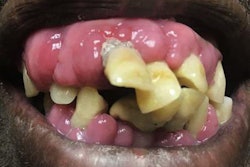Calcium channel blockers and diuretics, both of which are prescribed to manage high blood pressure, may potentially reduce the risk of dental caries, according to a study recently published in the International Journal of Genomics.
However, taking aldosterone antagonists, another type of antihypertensive medication, may be associated with an increased risk of developing caries, the authors wrote.
“Additional research is needed to assess the feasibility of repurposing antihypertensive medications for the prevention of dental caries,” wrote the authors, led by Dr. Ziyang Hu of the Shenzhen Longhua District Central Hospital in China (Int J Genomics, October 7, 2025, Vol. 1, 1612322).
Understanding the possible causal influence of high blood pressure medication on dental caries could have notable implications for clinical practice and public health policy. If a causal link could be confirmed, integrated care models that manage high blood pressure while mitigating adverse oral health outcomes could be developed, the authors wrote.
To investigate clinical uncertainty surrounding the effect of high blood pressure medications on caries, drug-target Mendelian randomization, an analytical method that uses genetic variants as instrumental variables to assess the causal relationship between the drug and tooth decay, was used. The UK Biobank and the FinnGen Project, which collects genetic information from the Finnish population, were used in the analysis. Genetic variants linked to systolic blood pressure near the drug target genes were used to proxy for the effects of the prescription drugs, according to the study.
A genetic analysis revealed that calcium channel blockers were linked to a 3.3% decrease in the risk of dental caries (odds ratio [OR]: 0.967; 95% confidence interval [CI]: 0.949 to 0.985) and loop diuretics was associated with a 6.9% drop in caries risk (OR: 0.931; 95% CI: 0.897 to 0.966), the authors wrote.
On the flip side, aldosterone antagonists were suggestively correlated with an 8.2% increased risk of caries (OR: 1.082; 95% CI: 1.017 to 1.150), they wrote.
Nevertheless, the research had limitations, including that the study did not stratify outcomes by the different kinds of caries. Due to restrictions in statistical power, this would be challenging, the authors wrote.
In the future, more studies need to be conducted to validate these findings, they wrote.
“If such research validates these initial findings, it may contribute to improved oral health outcomes on a broader scale by opening new avenues for caries prevention,” Hu and colleagues wrote.




















